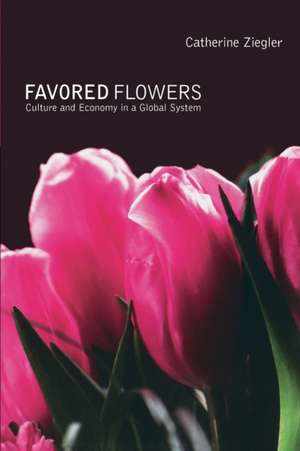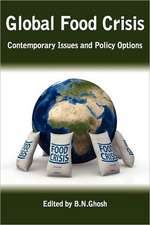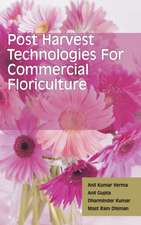Favored Flowers – Culture and Economy in a Global System
Autor Catherine Ziegleren Limba Engleză Paperback – 9 iul 2007
Preț: 262.91 lei
Nou
Puncte Express: 394
Preț estimativ în valută:
50.31€ • 53.80$ • 41.95£
50.31€ • 53.80$ • 41.95£
Carte tipărită la comandă
Livrare economică 18 aprilie-02 mai
Preluare comenzi: 021 569.72.76
Specificații
ISBN-13: 9780822340263
ISBN-10: 0822340267
Pagini: 320
Ilustrații: 17 photographs, 11 tables, 19 figures
Dimensiuni: 156 x 225 x 21 mm
Greutate: 0.42 kg
Editura: MD – Duke University Press
ISBN-10: 0822340267
Pagini: 320
Ilustrații: 17 photographs, 11 tables, 19 figures
Dimensiuni: 156 x 225 x 21 mm
Greutate: 0.42 kg
Editura: MD – Duke University Press
Recenzii
What might it mean to offer a biography of an everyday commodity, at once attentive to its conditions of production and distribution and yet never losing sight, as Marx asserted, of its magic, mystery, and fetishistic qualities under capitalism? Catherine Zieglers marvelous book Favored Flowers tackles the extraordinary world of the global flower industry, tracing the complex sinews linking growers in the Netherlands and Ecuador to retailers and consumers in New York. She takes the reader for an exhilarating ride along the cut-flower commodity chain, dirtying her hands in the greenhouses, interviewing middlemen and retail florists, and charting the floral contours of love and pleasure of the Upper East Side bourgeoisie. This is political and cultural economy of the highest order.Michael Watts, University of California, BerkeleyFavored Flowers is an excellent book, an extremely impressive and important piece of original research. A case study of the contemporary commodity chain has been the next big thing in anthropology, geography, and sociology for some time now, but this is one of the first studies that I have read that really lives up to the promise, including all the neglected middle sections of the chain. Here the wholesalers, the buyers, the packing, developing, storing, transporting, selecting, and distributing finally get the respect they deserve.Daniel Miller, editor of Materiality
Notă biografică
Catherine Ziegler received her Ph.D. in social and cultural anthropology from The New School for Social Research. She teaches history and anthropology at Parsons: The New School for Design. She is the author of "The Harmonious Garden."
Textul de pe ultima copertă
""Favored Flowers" is an excellent book, an extremely impressive and important piece of original research. A case study of the contemporary commodity chain has been the 'next big thing' in anthropology, geography, and sociology for some time now, but this is one of the first studies that I have read that really lives up to the promise, including all the neglected middle sections of the chain. Here the wholesalers, the buyers, the packing, developing, storing, transporting, selecting, and distributing finally get the respect they deserve."--Daniel Miller, editor of "Materiality"
Cuprins
Acknowledgments vii
Introduction 1
1. Tastes, Traditions, and Trade, 1870-1970 15
2. Favored Flowers: Growers and Traders, 1870-1970 33
3. Fresh Flows: Global Flower Growing, 1970-2005 55
4. State and Structure: Floriculture in a Global System 74
5. Cultivating the Global Garden: Local Growers in a Global System 97
6. Specialty and Abundance: Middlemen in a Changing System 130
7. Risk and Relationships: Middlemen Strategies 163
8. Self and Signs: Flower Consumers 192
Conclusion 227
Notes 235
Bibliography 277
Index 291
Introduction 1
1. Tastes, Traditions, and Trade, 1870-1970 15
2. Favored Flowers: Growers and Traders, 1870-1970 33
3. Fresh Flows: Global Flower Growing, 1970-2005 55
4. State and Structure: Floriculture in a Global System 74
5. Cultivating the Global Garden: Local Growers in a Global System 97
6. Specialty and Abundance: Middlemen in a Changing System 130
7. Risk and Relationships: Middlemen Strategies 163
8. Self and Signs: Flower Consumers 192
Conclusion 227
Notes 235
Bibliography 277
Index 291
Descriere
Cultural history of the flower trade in New York City and the transformation of the cut-flower industry into a global commodity system












